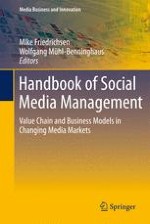2013 | OriginalPaper | Chapter
Predicting the Future of Investor Sentiment with Social Media in Stock Exchange Investments: A Basic Framework for the DAX Performance Index
Author : Artur Lugmayr
Published in: Handbook of Social Media Management
Publisher: Springer Berlin Heidelberg
Activate our intelligent search to find suitable subject content or patents.
Select sections of text to find matching patents with Artificial Intelligence. powered by
Select sections of text to find additional relevant content using AI-assisted search. powered by
